Pengrui Han
Rethinking the Reranker: Boundary-Aware Evidence Selection for Robust Retrieval-Augmented Generation
Feb 03, 2026Abstract:Retrieval-Augmented Generation (RAG) systems remain brittle under realistic retrieval noise, even when the required evidence appears in the top-K results. A key reason is that retrievers and rerankers optimize solely for relevance, often selecting either trivial, answer-revealing passages or evidence that lacks the critical information required to answer the question, without considering whether the evidence is suitable for the generator. We propose BAR-RAG, which reframes the reranker as a boundary-aware evidence selector that targets the generator's Goldilocks Zone -- evidence that is neither trivially easy nor fundamentally unanswerable for the generator, but is challenging yet sufficient for inference and thus provides the strongest learning signal. BAR-RAG trains the selector with reinforcement learning using generator feedback, and adopts a two-stage pipeline that fine-tunes the generator under the induced evidence distribution to mitigate the distribution mismatch between training and inference. Experiments on knowledge-intensive question answering benchmarks show that BAR-RAG consistently improves end-to-end performance under noisy retrieval, achieving an average gain of 10.3 percent over strong RAG and reranking baselines while substantially improving robustness. Code is publicly avaliable at https://github.com/GasolSun36/BAR-RAG.
Adaptation of Agentic AI
Dec 22, 2025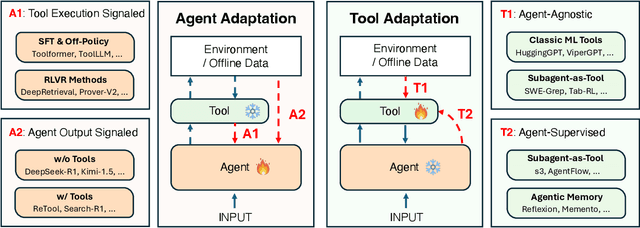
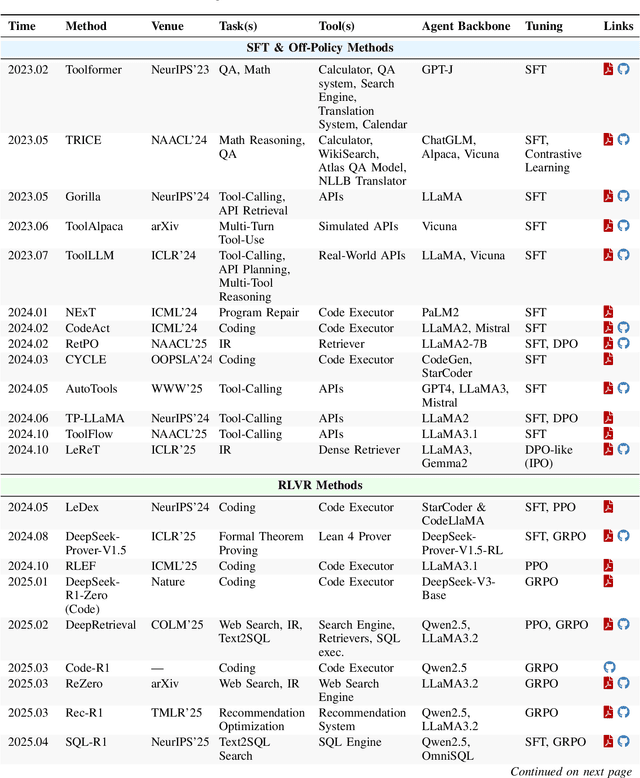
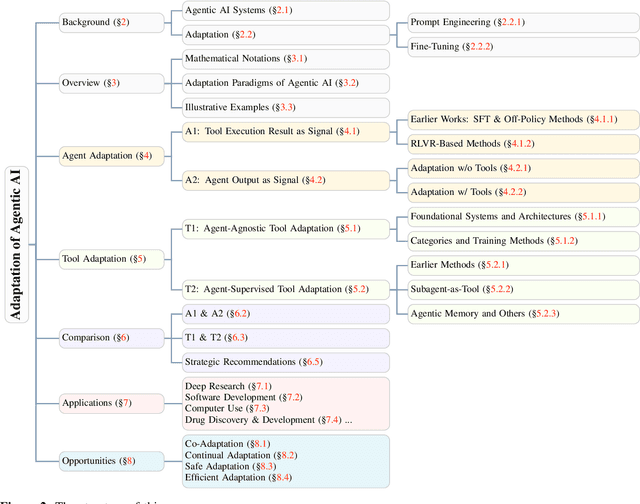
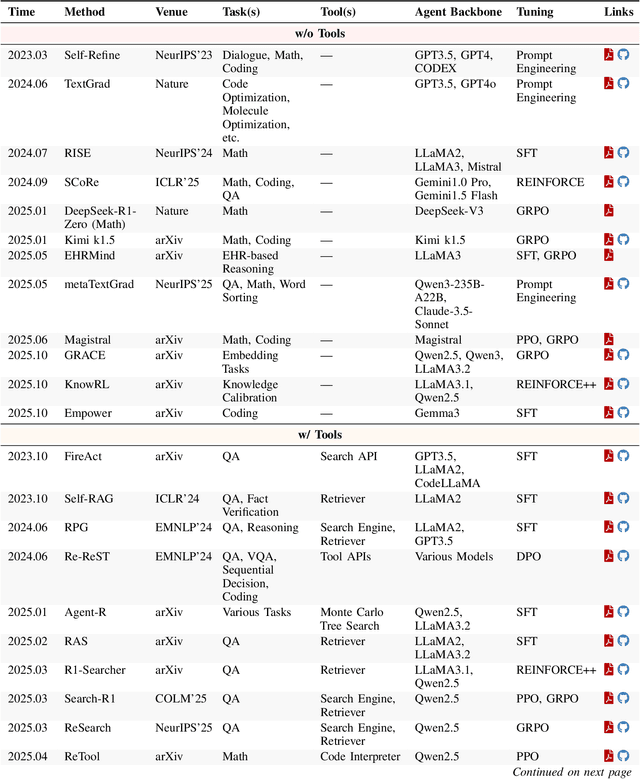
Abstract:Cutting-edge agentic AI systems are built on foundation models that can be adapted to plan, reason, and interact with external tools to perform increasingly complex and specialized tasks. As these systems grow in capability and scope, adaptation becomes a central mechanism for improving performance, reliability, and generalization. In this paper, we unify the rapidly expanding research landscape into a systematic framework that spans both agent adaptations and tool adaptations. We further decompose these into tool-execution-signaled and agent-output-signaled forms of agent adaptation, as well as agent-agnostic and agent-supervised forms of tool adaptation. We demonstrate that this framework helps clarify the design space of adaptation strategies in agentic AI, makes their trade-offs explicit, and provides practical guidance for selecting or switching among strategies during system design. We then review the representative approaches in each category, analyze their strengths and limitations, and highlight key open challenges and future opportunities. Overall, this paper aims to offer a conceptual foundation and practical roadmap for researchers and practitioners seeking to build more capable, efficient, and reliable agentic AI systems.
The Personality Illusion: Revealing Dissociation Between Self-Reports & Behavior in LLMs
Sep 03, 2025Abstract:Personality traits have long been studied as predictors of human behavior.Recent advances in Large Language Models (LLMs) suggest similar patterns may emerge in artificial systems, with advanced LLMs displaying consistent behavioral tendencies resembling human traits like agreeableness and self-regulation. Understanding these patterns is crucial, yet prior work primarily relied on simplified self-reports and heuristic prompting, with little behavioral validation. In this study, we systematically characterize LLM personality across three dimensions: (1) the dynamic emergence and evolution of trait profiles throughout training stages; (2) the predictive validity of self-reported traits in behavioral tasks; and (3) the impact of targeted interventions, such as persona injection, on both self-reports and behavior. Our findings reveal that instructional alignment (e.g., RLHF, instruction tuning) significantly stabilizes trait expression and strengthens trait correlations in ways that mirror human data. However, these self-reported traits do not reliably predict behavior, and observed associations often diverge from human patterns. While persona injection successfully steers self-reports in the intended direction, it exerts little or inconsistent effect on actual behavior. By distinguishing surface-level trait expression from behavioral consistency, our findings challenge assumptions about LLM personality and underscore the need for deeper evaluation in alignment and interpretability.
Paper Copilot: A Self-Evolving and Efficient LLM System for Personalized Academic Assistance
Sep 06, 2024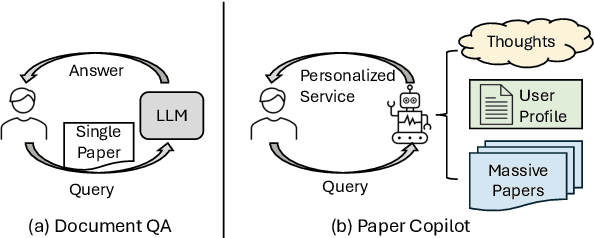
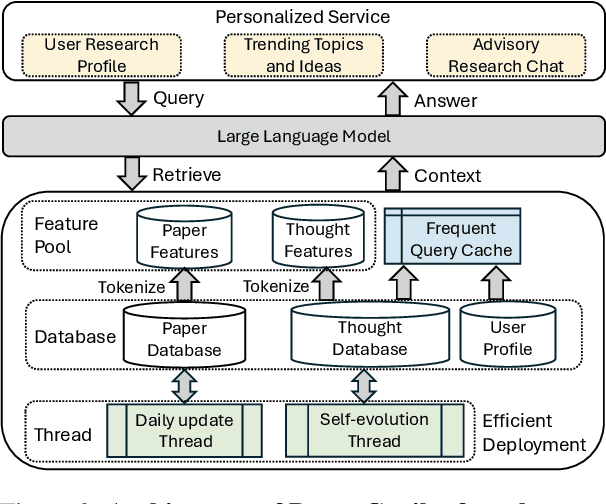
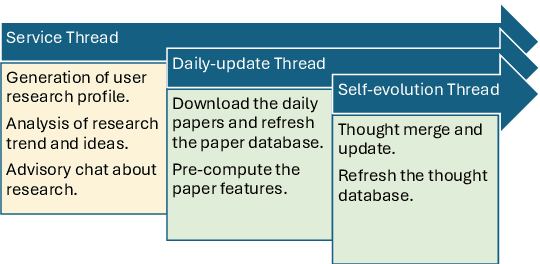
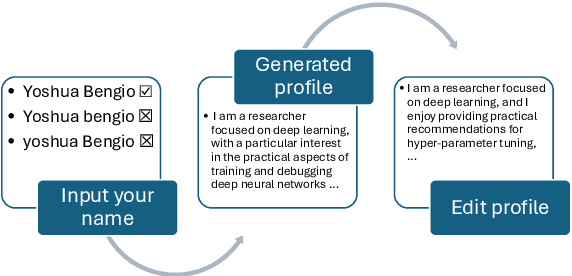
Abstract:As scientific research proliferates, researchers face the daunting task of navigating and reading vast amounts of literature. Existing solutions, such as document QA, fail to provide personalized and up-to-date information efficiently. We present Paper Copilot, a self-evolving, efficient LLM system designed to assist researchers, based on thought-retrieval, user profile and high performance optimization. Specifically, Paper Copilot can offer personalized research services, maintaining a real-time updated database. Quantitative evaluation demonstrates that Paper Copilot saves 69.92\% of time after efficient deployment. This paper details the design and implementation of Paper Copilot, highlighting its contributions to personalized academic support and its potential to streamline the research process.
ChatGPT Based Data Augmentation for Improved Parameter-Efficient Debiasing of LLMs
Feb 19, 2024Abstract:Large Language models (LLMs), while powerful, exhibit harmful social biases. Debiasing is often challenging due to computational costs, data constraints, and potential degradation of multi-task language capabilities. This work introduces a novel approach utilizing ChatGPT to generate synthetic training data, aiming to enhance the debiasing of LLMs. We propose two strategies: Targeted Prompting, which provides effective debiasing for known biases but necessitates prior specification of bias in question; and General Prompting, which, while slightly less effective, offers debiasing across various categories. We leverage resource-efficient LLM debiasing using adapter tuning and compare the effectiveness of our synthetic data to existing debiasing datasets. Our results reveal that: (1) ChatGPT can efficiently produce high-quality training data for debiasing other LLMs; (2) data produced via our approach surpasses existing datasets in debiasing performance while also preserving internal knowledge of a pre-trained LLM; and (3) synthetic data exhibits generalizability across categories, effectively mitigating various biases, including intersectional ones. These findings underscore the potential of synthetic data in advancing the fairness of LLMs with minimal retraining cost.
Exploring Social Bias in Downstream Applications of Text-to-Image Foundation Models
Dec 05, 2023Abstract:Text-to-image diffusion models have been adopted into key commercial workflows, such as art generation and image editing. Characterising the implicit social biases they exhibit, such as gender and racial stereotypes, is a necessary first step in avoiding discriminatory outcomes. While existing studies on social bias focus on image generation, the biases exhibited in alternate applications of diffusion-based foundation models remain under-explored. We propose methods that use synthetic images to probe two applications of diffusion models, image editing and classification, for social bias. Using our methodology, we uncover meaningful and significant inter-sectional social biases in \textit{Stable Diffusion}, a state-of-the-art open-source text-to-image model. Our findings caution against the uninformed adoption of text-to-image foundation models for downstream tasks and services.
 Add to Chrome
Add to Chrome Add to Firefox
Add to Firefox Add to Edge
Add to Edge